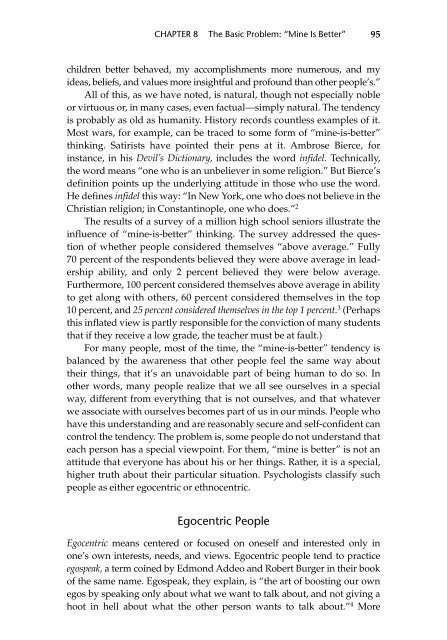Beyond Feelings
Beyond Feelings
Beyond Feelings
You also want an ePaper? Increase the reach of your titles
YUMPU automatically turns print PDFs into web optimized ePapers that Google loves.
CHAPTER 8 The Basic Problem: “Mine Is Better”<br />
children better behaved, my accomplishments more numerous, and my<br />
ideas, beliefs, and values more insightful and profound than other people’s.”<br />
All of this, as we have noted, is natural, though not especially noble<br />
or virtuous or, in many cases, even factual—simply natural. The tendency<br />
is probably as old as humanity. History records countless examples of it.<br />
Most wars, for example, can be traced to some form of “mine-is-better”<br />
thinking. Satirists have pointed their pens at it. Ambrose Bierce, for<br />
instance, in his Devil’s Dictionary, includes the word infidel. Technically,<br />
the word means “one who is an unbeliever in some religion.” But Bierce’s<br />
definition points up the underlying attitude in those who use the word.<br />
He defines infidel this way: “In New York, one who does not believe in the<br />
Christian religion; in Constantinople, one who does.” 2<br />
The results of a survey of a million high school seniors illustrate the<br />
influence of “mine-is-better” thinking. The survey addressed the question<br />
of whether people considered themselves “above average.” Fully<br />
70 percent of the respondents believed they were above average in leadership<br />
ability, and only 2 percent believed they were below average.<br />
Furthermore, 100 percent considered themselves above average in ability<br />
to get along with others, 60 percent considered themselves in the top<br />
10 percent, and 25 percent considered themselves in the top 1 percent. 3 (Perhaps<br />
this inflated view is partly responsible for the conviction of many students<br />
that if they receive a low grade, the teacher must be at fault.)<br />
For many people, most of the time, the “mine-is-better” tendency is<br />
balanced by the awareness that other people feel the same way about<br />
their things, that it’s an unavoidable part of being human to do so. In<br />
other words, many people realize that we all see ourselves in a special<br />
way, different from everything that is not ourselves, and that whatever<br />
we associate with ourselves becomes part of us in our minds. People who<br />
have this understanding and are reasonably secure and self-confident can<br />
control the tendency. The problem is, some people do not understand that<br />
each person has a special viewpoint. For them, “mine is better” is not an<br />
attitude that everyone has about his or her things. Rather, it is a special,<br />
higher truth about their particular situation. Psychologists classify such<br />
people as either egocentric or ethnocentric.<br />
Egocentric People<br />
Egocentric means centered or focused on oneself and interested only in<br />
one’s own interests, needs, and views. Egocentric people tend to practice<br />
egospeak, a term coined by Edmond Addeo and Robert Burger in their book<br />
of the same name. Egospeak, they explain, is “the art of boosting our own<br />
egos by speaking only about what we want to talk about, and not giving a<br />
hoot in hell about what the other person wants to talk about.” 4 More<br />
95


